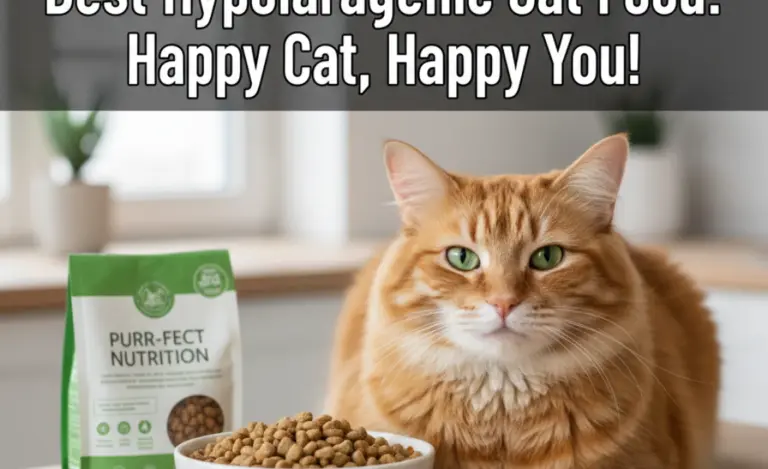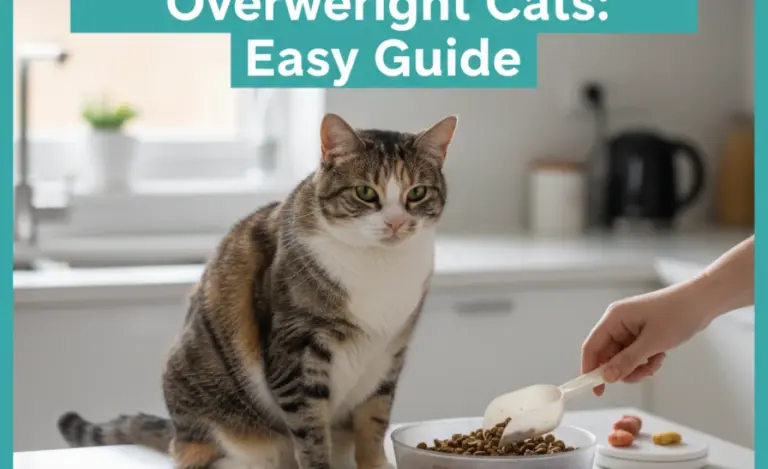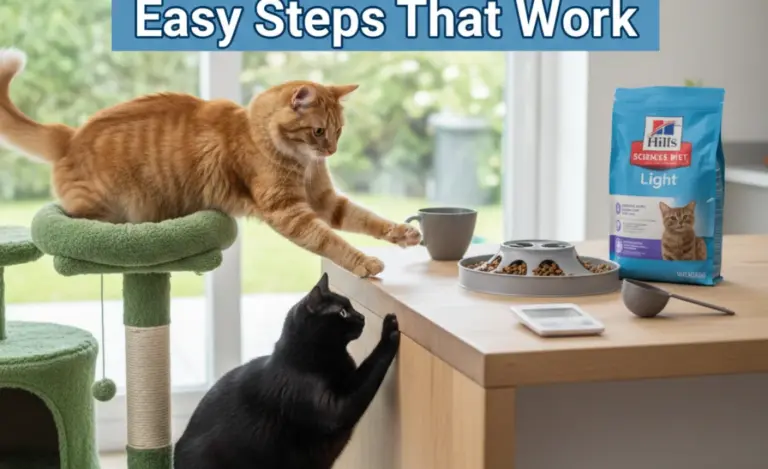Signs of HCM in British Shorthair: The Smart Guide
Have you ever seen a cat that seems tired all the time? Or one that has trouble breathing? It could be more than just a lazy kitty. British Shorthairs are awesome cats. But they can get a heart disease called Hypertrophic Cardiomyopathy, or HCM. Learning the signs of HCM in British Shorthair cats can help keep your kitty healthy. It is important to know what to look for. This way, you can help your cat get the care it needs. Let’s find out more about HCM.
Key Takeaways
- Early detection of signs of HCM in British Shorthair cats is very important.
- Regular vet check-ups can help find HCM before it becomes too serious.
- Breathing problems and lethargy are common signs of heart issues in cats.
- HCM can lead to blood clots and other problems, so fast action is vital.
- Knowing the symptoms helps you give your British Shorthair a happy, healthy life.
What Are The Early Signs of HCM in British Shorthair?
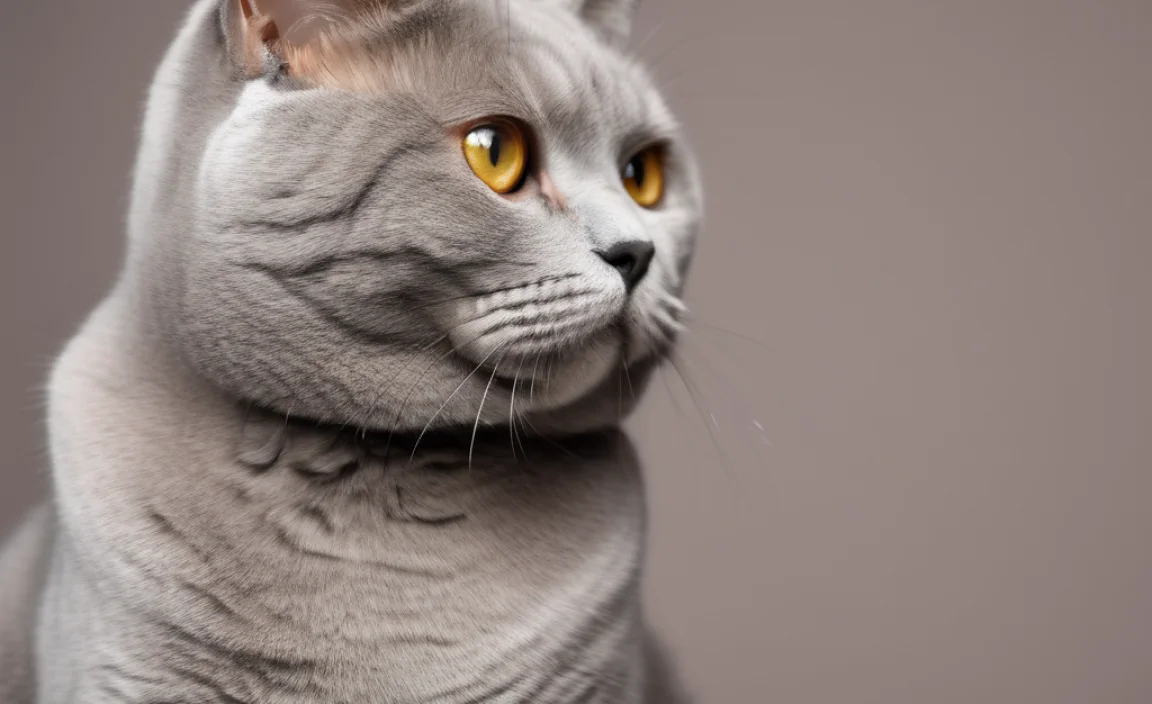
Finding HCM early can make a big difference. It’s like finding a small problem before it turns into a big one. Signs of HCM in British Shorthair cats can be subtle at first. Your cat might seem a bit more tired than usual. Maybe they don’t play as much. You might notice they are breathing faster, especially after playing. Sometimes, they might cough or gag. These small changes can be clues. They tell you something might not be right. It is important to pay attention to your cat’s behavior. If you see these early signs, talk to your vet. Early checks can help catch HCM before it gets worse. This gives your cat a better chance at a long and happy life.
- Lethargy (being tired)
- Faster breathing
- Coughing or gagging
- Reduced appetite
- Hiding more than usual
It’s crucial to watch how your cat acts every day. Do they still enjoy their favorite toys? Are they eating normally? A sudden change in how active they are should raise a red flag. Don’t wait to see if things get better on their own. Early action is key. Think of it like this: catching HCM early is like finding a tiny leak in a dam. It’s much easier to fix a small leak than to deal with a dam that bursts. Regular check-ups and keen observation are your best tools. They help keep your British Shorthair healthy and happy. This way, you can enjoy many years of cuddles and purrs together.
Is My Cat Just Lazy, Or Is It HCM?
It can be tricky to tell if your cat is just being lazy or if something is wrong. Cats do sleep a lot. But there’s a difference between a normal nap and being constantly tired. Does your cat still get excited for playtime or treats? If they seem uninterested in things they used to love, it could be a sign. Are they also breathing faster or coughing? These could be signs of HCM in British Shorthair cats. HCM can make cats feel very tired. It makes it hard for them to do normal things. If you are worried, it’s best to ask your vet. They can do tests to see if there is a problem. It’s always better to be safe than sorry. Your vet can help you make sure your cat is healthy and happy.
What Does Faster Breathing Look Like?
Faster breathing in cats can be hard to spot. Normal breathing for a cat is about 20 to 30 breaths per minute when they’re resting. You can watch their chest or belly to count. If they are breathing faster than 30 breaths per minute, that’s a sign. Look for other signs too. Are they breathing with their mouth open? Are their nostrils flaring? These are signs they are working hard to breathe. If you see these signs, especially with other symptoms like tiredness, it’s important to get help. Faster breathing can be a sign of many problems, including HCM. Your vet can help figure out what’s going on and how to help your cat breathe easier. Do not ignore changes in breathing patterns.
Why Is My Cat Coughing All Of A Sudden?
Coughing in cats isn’t as common as it is in dogs. So, if your cat starts coughing, it’s important to pay attention. Coughing can be a sign of different problems. It could be a hairball, but it could also be something more serious. HCM can cause fluid to build up in the lungs. This can make your cat cough. The cough might sound wet or raspy. Your cat might also gag or throw up after coughing. If the coughing is new or happens often, see your vet. They can check your cat’s lungs and heart. They can find out if the cough is related to HCM or another issue. Getting it checked early can help your cat feel better sooner.
Fun Fact or Stat: British Shorthairs are prone to HCM due to genetic factors, with approximately 15-20% of the breed being affected.
How Does HCM Affect British Shorthair Hearts?
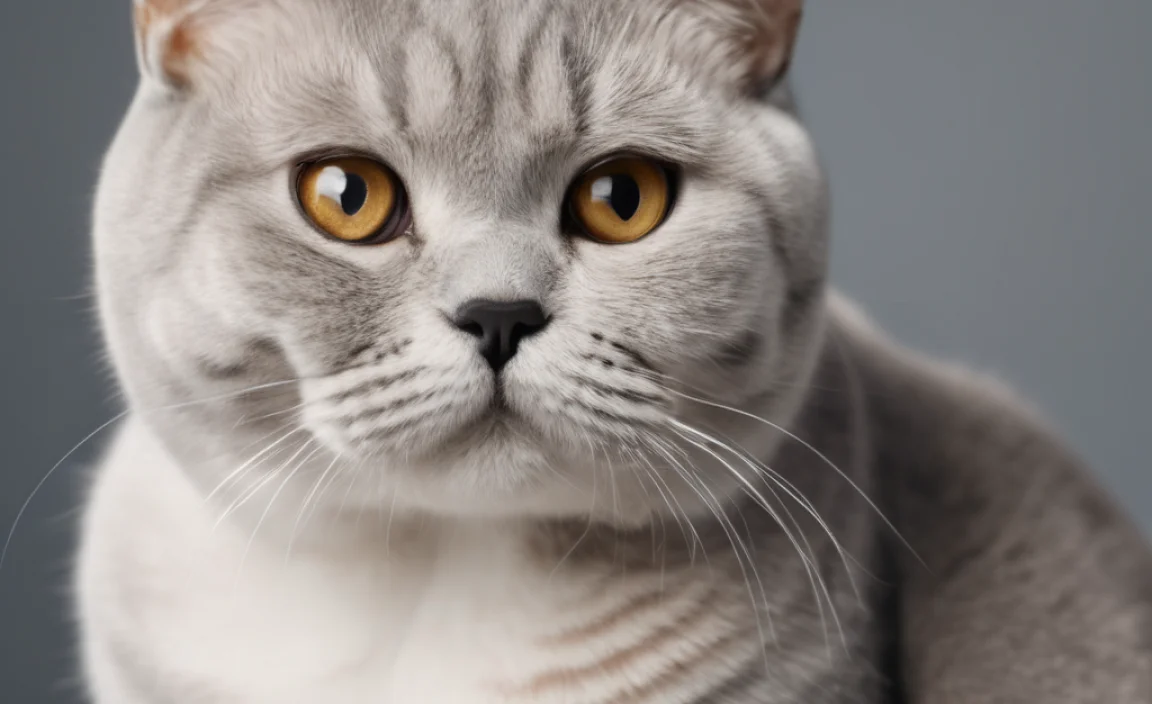
HCM, or Hypertrophic Cardiomyopathy, changes how a cat’s heart works. Imagine the heart as a pump that sends blood around the body. In a cat with HCM, the heart muscle gets thicker than it should. This thickening makes it harder for the heart to pump blood well. The heart has to work harder to do its job. Over time, this extra work can weaken the heart. It can also lead to other problems. The thickened heart can’t relax properly. This means it can’t fill with enough blood between beats. This can cause fluid to build up in the lungs. It can also cause blood clots to form. These clots can travel to other parts of the body and cause serious issues. Understanding how HCM affects the heart helps us know what signs of HCM in British Shorthair cats to watch for.
- Thickened heart muscle
- Reduced heart efficiency
- Difficulty relaxing the heart
- Fluid buildup in the lungs
- Formation of blood clots
Knowing this, you can see why it is so important to get your cat checked by a vet. A vet can listen to the heart and check for any unusual sounds. They can also do tests like an echocardiogram (an ultrasound of the heart). This test shows how thick the heart muscle is and how well it’s working. The earlier you catch HCM, the better you can manage it. Treatment can help slow down the disease and improve your cat’s quality of life. Think of it like taking care of a garden. If you pull the weeds early, the flowers have a better chance to grow. Similarly, early detection and care can help your cat’s heart stay healthier longer.
Why Does The Heart Muscle Thicken?
The heart muscle thickens in HCM for a few reasons. Mostly, it’s because of genes. Some cats inherit genes that make their heart muscle grow too much. It’s like having a blueprint that tells the heart to build itself bigger than normal. Sometimes, other health problems can also cause the heart to thicken. High blood pressure or thyroid problems can put extra stress on the heart. This stress can make the heart muscle grow. However, in most cases of HCM in British Shorthairs, it’s due to those inherited genes. These genes cause changes in the heart cells. These changes make the cells get bigger and more disorganized. This leads to the thickening of the heart muscle. Knowing the cause helps vets find the best way to treat the problem.
How Does Thickening Affect Blood Flow?
When the heart muscle thickens, it makes it harder for blood to flow through the heart. Imagine trying to squeeze water through a pipe that’s getting narrower. The water has to work harder to get through. The same thing happens in the heart. The thickened muscle makes the chambers inside the heart smaller. This means there’s less room for blood to fill the heart between beats. Also, the thickened muscle can make it harder for the heart to relax. This makes it even harder for blood to flow in. As a result, the heart has to work much harder to pump enough blood to the rest of the body. This extra work can lead to other problems, like fluid buildup in the lungs and blood clots.
What Are The Risks of Blood Clots?
Blood clots are a big worry with HCM. When the heart isn’t pumping blood well, blood can start to pool in the heart. This pooled blood can form clots. These clots can break loose and travel through the bloodstream. They can get stuck in smaller blood vessels, blocking blood flow. This is very dangerous. If a clot blocks blood flow to the legs, it can cause paralysis. The cat might suddenly be unable to move their back legs. This is very painful and needs immediate vet care. Clots can also travel to other organs, like the brain or kidneys, causing serious damage. Preventing blood clots is a key part of managing HCM. Vets might prescribe medicines to help prevent clots from forming. These medicines can help keep the blood flowing smoothly and reduce the risk of these dangerous events.
Fun Fact or Stat: Blood clots are a major complication of HCM, with about 25% of affected cats experiencing a clot-related event.
What Tests Can Detect HCM in British Shorthairs?
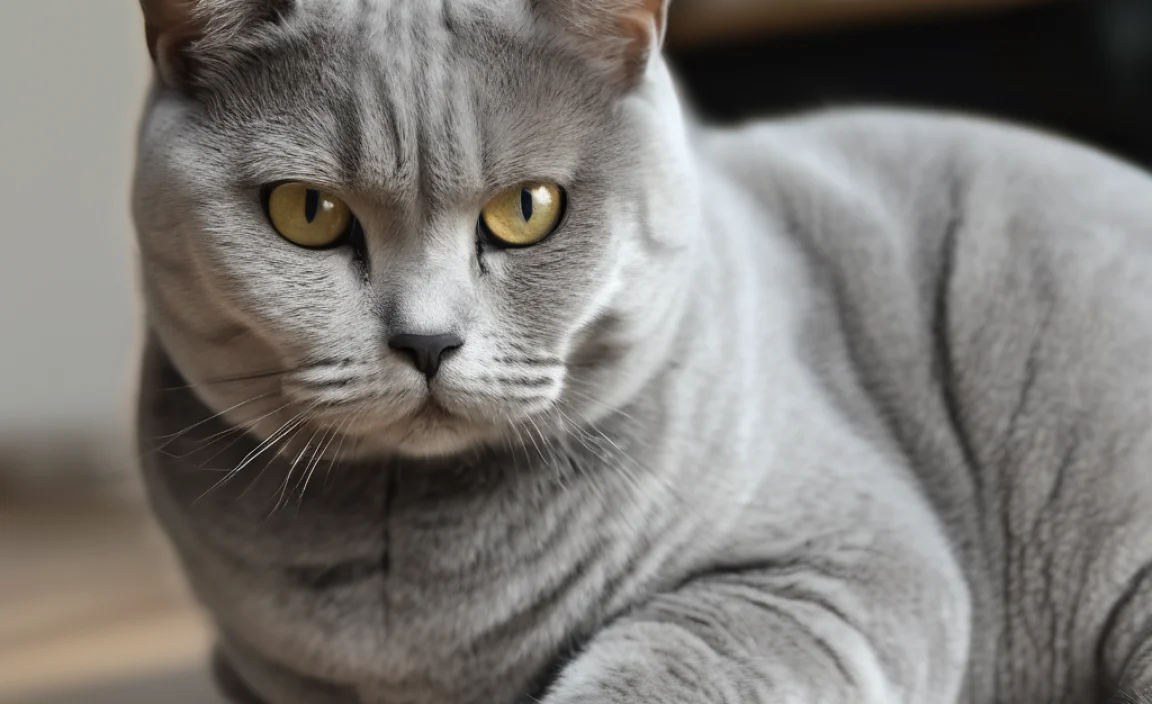
Finding HCM early is key. Vets use different tests to check for it. One common test is an echocardiogram. This is like an ultrasound for the heart. It shows the vet how thick the heart muscle is. It also shows how well the heart is pumping blood. Another test is an EKG, or electrocardiogram. This test measures the electrical activity of the heart. It can show if the heart is beating normally. Vets also use blood tests. These tests can check for signs of heart problems. One test, called a NT-proBNP test, measures a substance released when the heart is stressed. If the levels are high, it could mean the heart is working too hard. These tests, along with a physical exam, help vets find signs of HCM in British Shorthair cats early.
| Test | What It Measures | How It Helps Detect HCM | Is It Invasive? |
|---|---|---|---|
| Echocardiogram | Heart muscle thickness and function | Shows thickening of the heart muscle | No |
| EKG (Electrocardiogram) | Electrical activity of the heart | Detects abnormal heart rhythms | No |
| NT-proBNP Blood Test | Substance released when the heart is stressed | High levels suggest heart problems | Yes (blood draw) |
| Physical Exam | Heart sounds and breathing | Detects murmurs or abnormal breathing | No |
- Echocardiogram (heart ultrasound)
- EKG (measures heart’s electrical activity)
- NT-proBNP blood test
- Physical exam (listening to heart)
- Genetic testing (if available)
Remember, regular vet visits are super important. Your vet can listen to your cat’s heart and check for any unusual sounds, like a heart murmur. They can also watch for any changes in your cat’s breathing or behavior. If your vet suspects HCM, they will likely recommend more tests. These tests can give a clearer picture of your cat’s heart health. Don’t be afraid to ask your vet questions. Understanding the tests and what they mean can help you make the best choices for your cat. Think of it like solving a puzzle. Each test gives you a piece of the puzzle. Together, they help you see the whole picture of your cat’s heart health. This way, you can work with your vet to keep your cat healthy and happy.
What Does An Echocardiogram Show?
An echocardiogram is like a movie of your cat’s heart. It uses sound waves to create pictures of the heart. The vet can see how thick the heart muscle is. They can also see how well the heart is pumping blood. The echocardiogram can show if the heart chambers are enlarged or if there are any problems with the heart valves. It can also help the vet see if there are any blood clots in the heart. This test is very helpful for diagnosing HCM. It gives the vet a detailed look at the heart. This helps them make the right treatment plan for your cat.
How Does An EKG Help?
An EKG, or electrocardiogram, measures the electrical activity of the heart. The heart uses electrical signals to tell it when to beat. An EKG can show if these signals are normal. It can detect abnormal heart rhythms, like a heart that’s beating too fast or too slow. These abnormal rhythms can be a sign of heart problems, including HCM. The EKG is a non-invasive test. It doesn’t hurt your cat. Small sensors are placed on your cat’s skin. These sensors pick up the electrical signals from the heart. The EKG can help the vet get a better understanding of how your cat’s heart is working.
Why Is Genetic Testing Useful?
Genetic testing can be useful for British Shorthairs because HCM can be passed down through their genes. A genetic test can check for specific genes that are linked to HCM. If a cat has these genes, it doesn’t mean they will definitely get HCM. But it does mean they have a higher risk. Genetic testing can be helpful for breeders. They can use the test to help them choose which cats to breed. This can help reduce the number of cats born with the genes for HCM. Genetic testing can also be helpful for cat owners. If you know your cat has a higher risk, you can watch for signs of HCM in British Shorthair cats and get them checked by the vet regularly.
Fun Fact or Stat: An echocardiogram is the gold standard for diagnosing HCM in cats, providing detailed images of the heart’s structure and function.
What Are The Treatment Options for HCM?
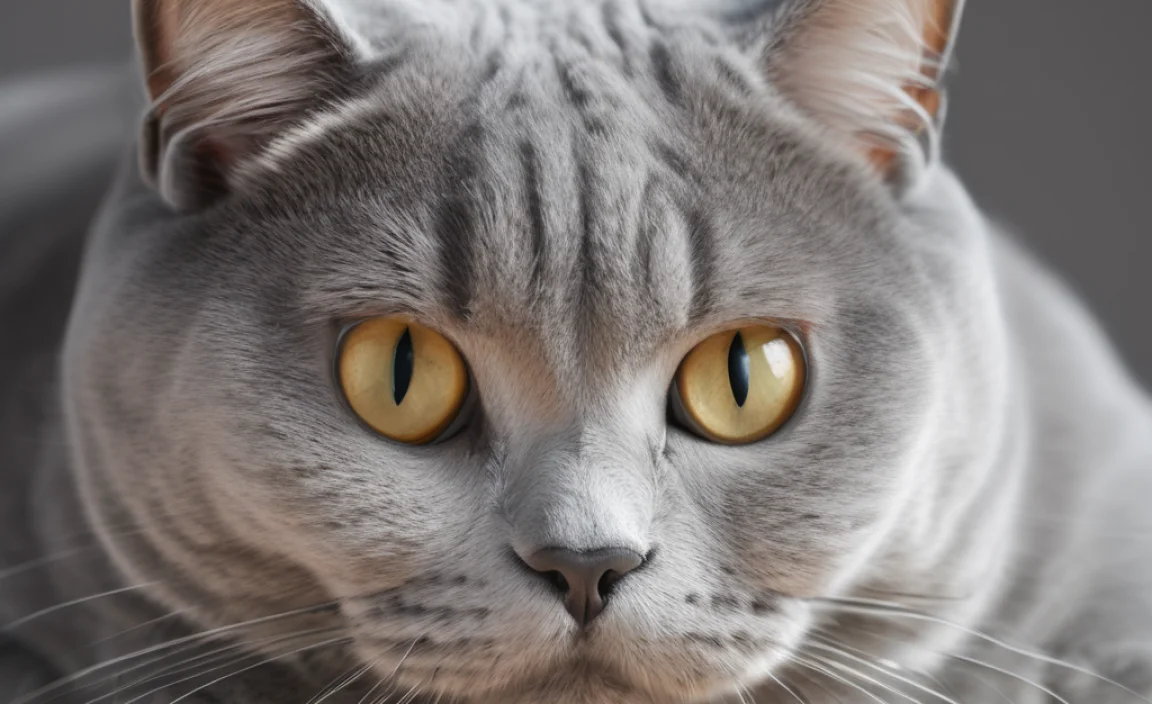
There’s no cure for HCM, but there are ways to manage it. Treatment focuses on making your cat feel better and slowing down the disease. Vets might prescribe medicines to help the heart pump blood more easily. These medicines can help the heart relax and fill with blood. Other medicines can help prevent blood clots from forming. If your cat has fluid in its lungs, the vet might give them a diuretic. This helps remove the extra fluid. Diet changes can also help. A low-sodium diet can reduce fluid buildup. Regular vet check-ups are important to monitor how well the treatment is working. The goal is to keep your cat comfortable and active for as long as possible. Recognizing the signs of HCM in British Shorthair allows for timely treatment.
- Medications to improve heart function
- Drugs to prevent blood clots
- Diuretics to remove fluid from the lungs
- Low-sodium diet
- Regular vet check-ups
It’s important to follow your vet’s instructions carefully. Give your cat their medicine on time. Make sure they eat the right food. Watch for any changes in their behavior or health. If you notice anything new, call your vet. They might need to adjust the treatment. Managing HCM is a team effort. You, your vet, and your cat are all working together. With good care, many cats with HCM can live happy and comfortable lives. Think of it like managing a chronic illness in people. With the right treatment and care, people can still live full lives. The same is true for cats with HCM. With your love and care, your cat can enjoy many more purrs and cuddles.
How Do Medications Help?
Medications play a big role in managing HCM. Some medicines help the heart relax. This makes it easier for the heart to fill with blood. Other medicines help the heart pump more strongly. This makes sure the body gets enough blood. Some medicines help prevent blood clots. These clots can be very dangerous. They can block blood flow to important organs. Diuretics help remove extra fluid from the lungs. This makes it easier for the cat to breathe. Your vet will choose the right medicines for your cat based on their specific needs. It’s important to give these medicines exactly as your vet tells you to. This will help your cat feel their best.
Why Is Diet Important?
Diet is very important for cats with HCM. A low-sodium diet can help reduce fluid buildup in the body. Sodium can make the body hold onto water. This can make it harder for the heart to pump. Your vet might recommend a special food that’s low in sodium. It’s important to follow your vet’s advice on what to feed your cat. Avoid giving them salty treats or table scraps. A healthy diet can help your cat feel better and live longer. It’s like giving your cat the right fuel for their body. Just like a car needs the right gas, your cat needs the right food.
What Can I Do At Home?
There are many things you can do at home to help your cat with HCM. Make sure they get their medicine on time. Provide a quiet and comfortable place for them to rest. Avoid stressful situations. Stress can make HCM worse. Watch for any signs of HCM in British Shorthair cats, like coughing or trouble breathing. Keep your vet informed of any changes. Gentle exercise can be good for your cat. But don’t let them get too tired. Lots of love and attention can also help. Your cat needs your support. With your help, they can live a happy life. Remember, you are their best friend and advocate.
Fun Fact or Stat: With proper management, cats with HCM can live for several years after diagnosis, enjoying a good quality of life.
What Is The Prognosis For British Shorthairs With HCM?
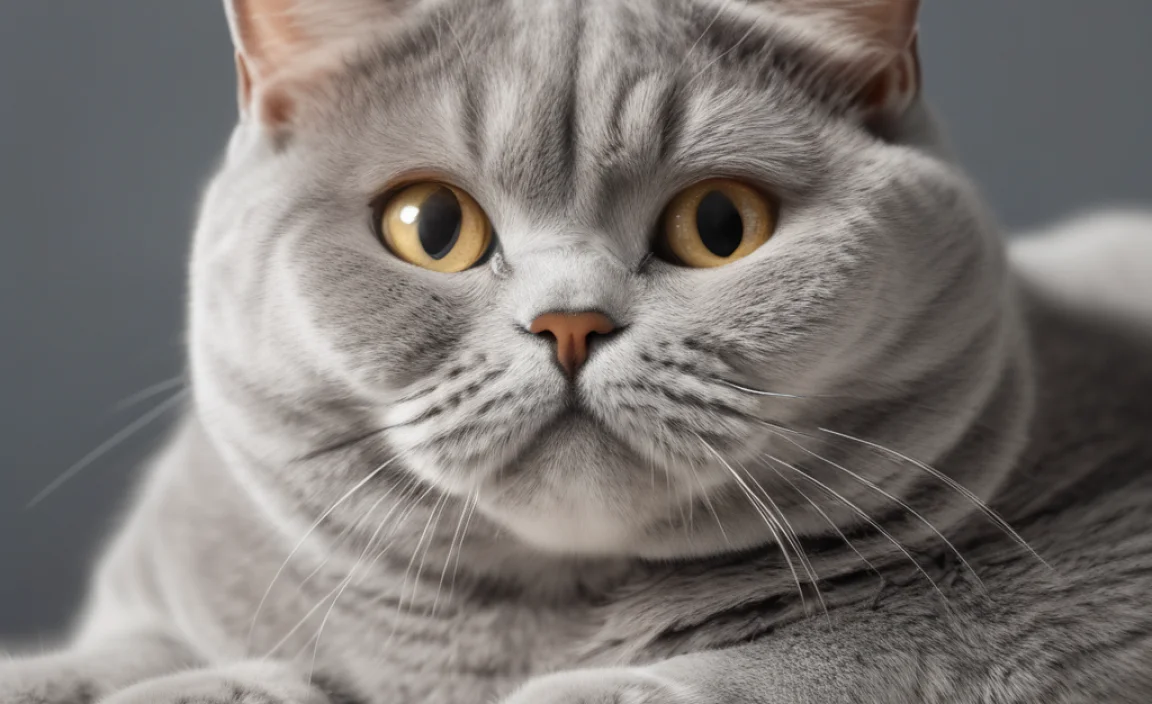
The prognosis, or expected outcome, for British Shorthairs with HCM can vary. It depends on how severe the disease is and how well it’s managed. Some cats with mild HCM might live for many years with few problems. Other cats with more severe HCM might have a shorter lifespan. Early detection and treatment can make a big difference. Cats that are diagnosed early and get good care tend to live longer. It’s important to work closely with your vet to manage your cat’s HCM. Regular check-ups and following the vet’s advice can help improve your cat’s prognosis. While HCM can be a serious disease, many cats can still live happy and comfortable lives with the right care. Always watch for any signs of HCM in British Shorthair cats and take quick action.
- Varies depending on severity
- Early detection improves prognosis
- Good management is crucial
- Some cats live many years
- Regular vet check-ups are key
Remember, every cat is different. Some cats respond well to treatment. Others might not. It’s important to be patient and supportive. Do your best to give your cat the best possible care. Don’t be afraid to ask your vet questions. They are there to help you understand your cat’s condition and make the best choices for their health. Think of it like navigating a road trip. You might not know exactly how long it will take to get to your destination. But with a good map (your vet’s advice) and a reliable car (your cat’s health), you can make the journey as smooth as possible. With your love and care, your cat can enjoy a good quality of life, even with HCM.
How Does Severity Affect Lifespan?
The severity of HCM greatly affects a cat’s lifespan. Mild cases might not shorten a cat’s life much. These cats might have few or no symptoms. They can live for many years with regular check-ups. Severe cases can be more serious. These cats might have trouble breathing, blood clots, or other complications. Their lifespan might be shorter. It’s important to remember that every cat is different. Even with severe HCM, some cats can live longer than expected with good care. The key is to work closely with your vet to manage the disease and keep your cat comfortable.
What Role Does Management Play?
Good management plays a huge role in the prognosis of HCM. This includes giving your cat their medicine on time. It also means feeding them the right diet. Regular vet check-ups are also very important. Your vet can monitor your cat’s heart and adjust the treatment as needed. You can also help by watching for signs of HCM in British Shorthair cats, like coughing or lethargy. If you notice any changes, let your vet know right away. Good management can help slow down the disease and improve your cat’s quality of life. It’s like taking care of a plant. With the right water, sunlight, and fertilizer, the plant can thrive.
Can Cats With HCM Live Normal Lives?
Some cats with HCM can live relatively normal lives. This is especially true for cats with mild cases. They might not have any symptoms. They can play, eat, and sleep like any other cat. Other cats with more severe HCM might need more care. They might need medicine and a special diet. They might not be able to play as much. But with good management, they can still enjoy a good quality of life. It’s important to focus on making your cat comfortable and happy. Give them lots of love and attention. This can help them feel their best, even with HCM.
Fun Fact or Stat: Early detection and proper management can extend the lifespan of cats with HCM by an average of 2-5 years.
How Can I Prevent HCM in My British Shorthair?
You can’t always prevent HCM in British Shorthairs. It’s often caused by genes. But there are some things you can do to reduce the risk. If you’re buying a British Shorthair kitten, ask the breeder about HCM. Ask if the parents have been tested for the disease. Responsible breeders will test their cats and not breed cats with HCM. Regular vet check-ups are also important. Your vet can listen to your cat’s heart and watch for any signs of problems. A healthy diet and exercise can also help keep your cat’s heart healthy. While you can’t guarantee your cat won’t get HCM, these steps can help lower the risk. Being aware of the signs of HCM in British Shorthair is also very important.
- Buy from responsible breeders
- Ask about HCM testing of parents
- Regular vet check-ups
- Healthy diet and exercise
- Avoid breeding affected cats
Remember, even if you do everything right, your cat could still get HCM. It’s just part of the breed’s genetics. But don’t let that scare you. Many cats with HCM can live happy and comfortable lives with good care. The key is to be informed and proactive. Know the signs of HCM in British Shorthair cats. Get your cat checked by the vet regularly. Follow your vet’s advice. With your love and care, your British Shorthair can thrive, even if they have HCM. Think of it like planting a tree. You can’t control the weather, but you can give the tree the best possible start by planting it in the right place, giving it water, and protecting it from pests.
Why Is Breeder Responsibility Important?
Breeder responsibility is super important when it comes to HCM. Breeders should test their cats for HCM before breeding them. If a cat has HCM, it shouldn’t be bred. This helps prevent the disease from being passed on to kittens. Responsible breeders also keep track of their cats’ health history. They can tell you if there’s a history of HCM in the cat’s family. They are honest about the risks. Choosing a responsible breeder can greatly reduce your chances of getting a kitten with HCM. It’s like buying a car from a reputable dealer. You’re more likely to get a reliable car if you buy from someone who cares about quality.
How Does Diet Affect Heart Health?
Diet has a big impact on a cat’s heart health. A healthy diet can help keep the heart strong. It can also help prevent other health problems that can stress the heart. Avoid giving your cat too much salt. Too much salt can cause fluid buildup. Make sure your cat gets enough protein. Protein helps build and repair tissues, including the heart muscle. Talk to your vet about the best food for your cat. They can recommend a diet that’s right for their needs. A good diet is like giving your cat the fuel they need to stay healthy and active.
What Exercise Is Safe For British Shorthairs?
Exercise is important for all cats, including British Shorthairs. But it’s important to be careful not to overdo it. Gentle exercise is best. Short play sessions with toys are a good way to get your cat moving. Avoid strenuous activities that can put too much stress on the heart. If your cat has HCM, talk to your vet about what kind of exercise is safe for them. They can give you advice based on your cat’s condition. Remember, the goal is to keep your cat active and healthy without putting too much strain on their heart. It’s like going for a walk. A gentle stroll is good for you, but running a marathon might be too much.
Fun Fact or Stat: Responsible breeding practices, including genetic screening, can significantly reduce the incidence of HCM in British Shorthairs.
What Are Other Heart Problems In British Shorthairs?
Besides HCM, British Shorthairs can sometimes get other heart problems. One is Dilated Cardiomyopathy (DCM). In DCM, the heart muscle becomes weak and thin. This makes it hard for the heart to pump blood. Another problem is Mitral Valve Dysplasia. This is when the mitral valve, which controls blood flow in the heart, doesn’t work right. This can cause blood to leak back into the heart. British Shorthairs can also get heart murmurs. A heart murmur is an unusual sound that the vet can hear when listening to the heart. It can be a sign of a heart problem. It’s important to know about these other problems. This way, you can watch for any signs of HCM in British Shorthair cats or other heart issues.
- Dilated Cardiomyopathy (DCM)
- Mitral Valve Dysplasia
- Heart Murmurs
- Arrhythmias (irregular heartbeats)
- Endocarditis (heart valve infection)
If you notice anything unusual about your cat’s heart, see your vet. Early detection and treatment can make a big difference for many heart problems. Remember, your vet is your best resource for keeping your cat healthy. Don’t be afraid to ask questions and share your concerns. Think of it like taking care of a car. You might not know everything about how the engine works. But you know to take it to a mechanic if you hear a strange noise. Your vet is like a mechanic for your cat’s heart. They can help you keep it running smoothly. This way, you can enjoy many years of cuddles and purrs with your British Shorthair.
What Is Dilated Cardiomyopathy (DCM)?
Dilated Cardiomyopathy (DCM) is a heart disease where the heart muscle becomes weak and thin. This makes the heart bigger than it should be. The heart can’t pump blood as well. This can lead to fluid buildup in the lungs and other problems. DCM used to be more common in cats. But now, it’s less common because cat food companies add taurine to their food. Taurine is an important nutrient that helps keep the heart healthy. If your cat has DCM, they might need medicine to help their heart pump better. They might also need a special diet. Regular vet check-ups are important to monitor their condition.
What Is Mitral Valve Dysplasia?
Mitral Valve Dysplasia is a problem with one of the valves in the heart. The mitral valve controls blood flow between two chambers of the heart. In cats with Mitral Valve Dysplasia, the valve doesn’t close properly. This causes blood to leak backward. This can make the heart work harder. It can also lead to fluid buildup in the lungs. Cats with Mitral Valve Dysplasia might have a heart murmur. They might also have trouble breathing. Treatment can include medicine to help the heart pump better and remove extra fluid. Some cats might need surgery to fix the valve.
How Are Heart Murmurs Detected?
Heart murmurs are detected during a physical exam at the vet. The vet uses a stethoscope to listen to the cat’s heart. A normal heart makes a “lub-dub” sound. A heart murmur is an extra sound that can be heard between the “lub” and the “dub.” It might sound like a whooshing or swishing noise. Heart murmurs can be caused by many things. Some are harmless. Others are a sign of a heart problem. If your vet hears a heart murmur, they might recommend more tests. These tests can help find out what’s causing the murmur. It’s like hearing a strange noise in your house. You might need to investigate to find out what’s causing it.
Fun Fact or Stat: Taurine deficiency used to be a major cause of DCM in cats, but it is now less common due to taurine supplementation in cat food.
Summary
British Shorthairs are prone to Hypertrophic Cardiomyopathy (HCM), a heart disease where the heart muscle thickens. Recognizing the signs of HCM in British Shorthair cats is crucial. Early symptoms include lethargy, rapid breathing, and coughing. Vets use echocardiograms, EKGs, and blood tests to diagnose HCM. While there’s no cure, treatments like medication, diet changes, and regular vet visits can help manage the disease. The prognosis varies, but early detection and good care can improve a cat’s quality of life. Responsible breeding and a healthy lifestyle can reduce the risk. Besides HCM, British Shorthairs can also develop other heart problems. These include DCM and Mitral Valve Dysplasia. Regular vet check-ups are important for all cats. But they are especially important for British Shorthairs.
Conclusion
Taking care of a British Shorthair means watching for heart problems. Knowing the signs of HCM in British Shorthair cats can help you act fast. Early checks and good care can make a big difference. Talk to your vet often and keep your kitty healthy. With your love, your cat can have a long, happy life. Always stay informed and proactive. This will help you give your British Shorthair the best life possible. Remember, your cat depends on you to keep them safe and healthy.
Frequently Asked Questions
Question No 1: What is HCM in British Shorthairs?
Answer: HCM stands for Hypertrophic Cardiomyopathy. It’s a heart disease that can affect British Shorthair cats. With HCM, the heart muscle gets thicker than it should. This thickening makes it harder for the heart to pump blood. It can lead to other problems, like fluid buildup in the lungs and blood clots. HCM is often caused by genes. But it can also be caused by other health problems. Regular vet check-ups can help find HCM early. This way, you can start treatment and help your cat live a longer, healthier life. Being aware of the signs of HCM in British Shorthair cats helps you take action quickly.
Question No 2: How will my vet check my cat for HCM?
Answer: Your vet can check your cat for HCM in several ways. First, they will do a physical exam. They will listen to your cat’s heart with a stethoscope. They will check for any unusual sounds, like a heart murmur. If they hear a murmur or suspect something else, they might recommend more tests. These tests can include an echocardiogram, which is an ultrasound of the heart. They might also do an EKG, which measures the electrical activity of the heart. Blood tests can also help. One blood test measures a substance released when the heart is stressed. All these tests help your vet get a clear picture of your cat’s heart health. Identifying the signs of HCM in British Shorthair cats also helps.
Question No 3: What are the main signs of HCM in British Shorthairs?
Answer: The main signs of HCM in British Shorthair cats can be easy to miss at first. Your cat might seem more tired than usual. They might not want to play as much. You might notice they are breathing faster, especially after playing. Sometimes, they might cough or gag. In more serious cases, they might have trouble breathing or even collapse. It’s important to pay attention to any changes in your cat’s behavior. If you see any of these signs, talk to your vet right away. Early detection and treatment can make a big difference. Don’t wait to see if things get better on their own. Acting quickly can help your cat live a longer, healthier life.
Question No 4: Can HCM be cured in British Shorthairs?
Answer: Unfortunately, there’s no cure for HCM in British Shorthairs. But there are many ways to manage the disease. Treatment focuses on making your cat feel better and slowing down the disease. Vets might prescribe medicines to help the heart pump blood more easily. Other medicines can help prevent blood clots from forming. If your cat has fluid in its lungs, the vet might give them a diuretic to remove the extra fluid. Diet changes can also help. Regular vet check-ups are important to monitor how well the treatment is working. The goal is to keep your cat comfortable and active for as long as possible. Recognizing the signs of HCM in British Shorthair cats is very important.
Question No 5: How can I help my British Shorthair with HCM?
Answer: There are many things you can do to help your British Shorthair with HCM. First, follow your vet’s instructions carefully. Give your cat their medicine on time. Make sure they eat the right food. Provide a quiet and comfortable place for them to rest. Avoid stressful situations. Stress can make HCM worse. Watch for any signs of problems, like coughing or trouble breathing. Keep your vet informed of any changes. Gentle exercise can be good for your cat. But don’t let them get too tired. Most importantly, give them lots of love and attention. Your cat needs your support. With your help, they can live a happy life. Keeping an eye out for the signs of HCM in British Shorthair cats is also key.
Question No 6: Is HCM common in all British Shorthairs?
Answer: HCM is more common in British Shorthairs than in some other breeds of cats. But not all British Shorthairs will get HCM. It’s estimated that a significant percentage

